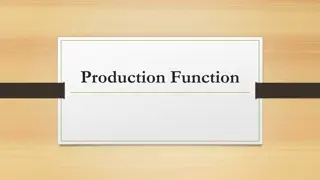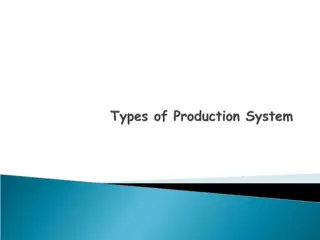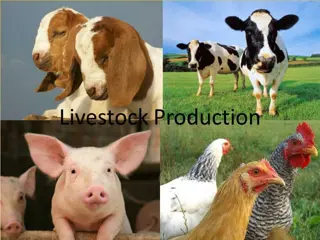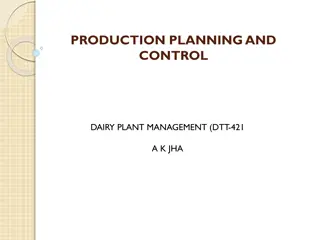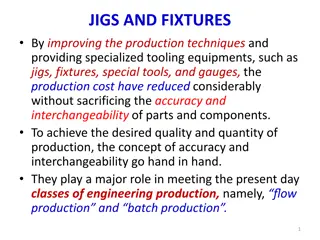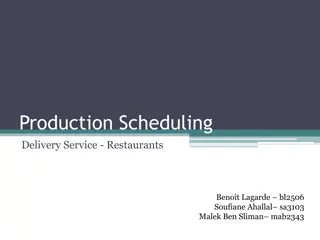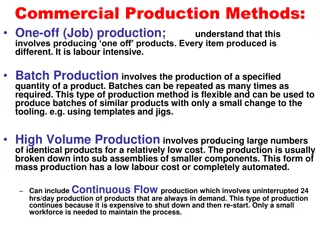Understanding Co-Production in Service Delivery
Co-production in service delivery brings together individuals, organizations, and commissioners to collaboratively design, deliver, and monitor services. It emphasizes equality, diversity, and active participation of service users. Learn why co-production is essential, its principles, and how to implement it effectively for optimal outcomes.
Download Presentation

Please find below an Image/Link to download the presentation.
The content on the website is provided AS IS for your information and personal use only. It may not be sold, licensed, or shared on other websites without obtaining consent from the author. Download presentation by click this link. If you encounter any issues during the download, it is possible that the publisher has removed the file from their server.
E N D
Presentation Transcript
Co Co- -production production conference conference
Agenda Agenda What is co-production? Why is co-production important? How to co-produce the principles of co-production
What is co-production? to co-produce is to make something together. Co-production is not just a word, it's not just a concept, it is a meeting of minds coming together to find shared solutions. TLAP National Co-production Advisory Group 'Co-production is when you as an individual influence the support and services you receive, or when groups of people get together to influence the way that services are designed, commissioned and delivered. The Care Act 2014 Co-production is an approach where people, family members, carers, organisations and commissioners work together in an equal way, sharing influence, skills and experience to design, deliver and monitor services and projects. The Co-production Network The active participation and involvement of the people who use services is essential in order to be empowered and enabled to engage in a partnership, where everyone's different contribution is valued equally.
What is co What is co- -production? production? Why is co Why is co- -production so important to us? production so important to us?
Why is co-production important? Co-production is an essential part of the commissioning cycle. Working in co-production wherever possible enables us to achieve the best outcomes for those who make use of our services. This includes individual, operational and strategic co-production. When it is not possible to work in co-production either due to statutory regulations, resource implications or time constraints, it is important to be clear, open and honest about this with all partners and stakeholders.
How to co-produce There are different models and methodologies that can be used it is an approach rather than one specific method Co-production stems from the recognition that if organisations are to deliver successful services, they must understand the needs of their users and engage them closely in the design and delivery of those services.
Principles of co-production It may be useful to approach co-production as a set of values. The following principles are crucial for putting coproduction into action. Equality (everyone has assets) Co-production starts from the idea that no one group or person is more important than anyone else and everyone has skills, abilities and time to contribute. Diversity (valuing difference) Co-production should be as inclusive and diverse as possible. Particular efforts may be needed to ensure that seldom heard groups are included. Accessibility (enabling and empowering) - Making everything accessible is the way to ensure that everyone has an equal opportunity to participate fully in an activity in the way that suits them best. Reciprocity (mutual benefits) - Reciprocity means people get something back for putting something in. There are formal ways of doing this, like using time banks as a way of rewarding people, but sometimes the reciprocity comes from the more equal relationships that develop between people and organisations. People feeling heard, valued and empowered can also be rewarding in itself, feeling that they are actually making a difference and that it is not just a tick box exercise.
What are the benefits of co-production? Co-production can help to: develop more equal partnerships between people who use services, carers and professionals. develop a shared understanding between everyone taking part in an activity. make better use of resources to ensure that they are used to develop the services that people really need. improve outcomes for people who use services and their carers. build stronger communities and develop citizenship. achieve long-term savings. There are up-front costs when organisations start co- production as money may be needed for training, access requirements and other expenses, however, it may lead to savings in the longer-term because it can help to ensure that people get services that they really need.
When co-production works well Co-production can be transformative. When it works well, co-production enables: Progression on from involvement and participation towards people who use services and their carers having an equal, more meaningful and powerful role in shaping services, alongside frontline staff. People who use services and carers being involved in all aspects of a service the planning, development and actual delivery of the service. Power and resources being transferred from managers to people who use services and carers. People who use services, carers and staff being recognised as assets who are valued.
Co-production across organisations Organisations may choose to work in co-production with those who make use of the services they deliver such as children, young people, families or schools and other educational settings because it is only by listening, understanding and valuing the perspectives of all those involved that the most effective solutions can be reached and thereby the best outcomes achieved. The aim is to enable service users to have greater influence, choice and control over the services they actually receive and use and how those services are provided. The process involves effective communication, being open, honest and realistic about the level of involvement and impact that can be achieved. Co-production can enable organisations to develop their culture, structure and practice in a way that has benefits for all.
Types of co-production There are different types of co-production, depending on the context, all of which are valid and valuable ways of working. Individual co-production involves professionals working with an individual or a family to co-produce a plan to meet the identified needs (e.g. an Early Help Plan, a Child in Need Plan or an Education, Health and Care Plan). Operational co-production can include professionals and service users such as families or schools working together on a document or other means of communicating information about services or a guidance document. Strategic co-production can include co-designing a new service, reviewing service performance, research, interview panels and involvement in decision-making.
Co Co- -production examples production examples
Co Co- -production examples production examples




